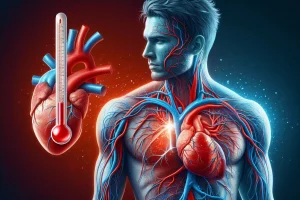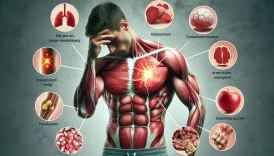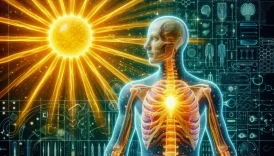How does high temperature increase heart risk?

Climate change is reshaping our environment, bringing with it increasingly frequent and intense heatwaves. While many associate extreme heat with discomfort or dehydration, there is a deeper and more alarming concern: the impact of high temperatures on heart health. So, How does high temperature increase heart risk? Understanding this connection is crucial for those seeking to protect their cardiovascular system and maintain overall health during hot weather.
- How does high temperature increase heart risk?
- 1. Heat and Dehydration: Stressing the Cardiovascular System
- 2. Increased Heart Rate and Blood Pressure
- 3. Heat Exhaustion and Heart Attack Risk
- 4. Impact on Blood Viscosity and Clotting
- 5. Heat and Inflammation: Triggering Heart Problems
- 6. Electrolyte Imbalance and Its Effect on the Heart
- 7. Pre-existing Conditions and Amplified Heart Risks
- 8. Conclusion: Protecting Your Heart in Hot Weather
1. Heat and Dehydration: Stressing the Cardiovascular System
One of the most direct ways in which high temperatures affect heart health is through dehydration. When the body is exposed to excessive heat, it attempts to cool itself down by sweating. This loss of fluids can lead to dehydration, which significantly impacts the cardiovascular system.
Dehydration causes the body’s blood volume to decrease, forcing the heart to work harder to pump blood throughout the body. This additional strain on the heart can lead to complications, particularly for those with pre-existing heart conditions. A dehydrated heart is also at higher risk of experiencing irregular heartbeats, or arrhythmias, which can further elevate heart risks during heat exposure.
To protect yourself, it’s crucial to stay hydrated in high temperatures. Drinking plenty of water, avoiding alcohol, and replenishing electrolytes can help maintain optimal fluid levels and reduce cardiovascular strain. People with heart disease or other cardiovascular issues should be especially cautious during hot weather, as their hearts are already working harder to maintain proper function.
2. Increased Heart Rate and Blood Pressure
When exposed to high temperatures, the body initiates several physiological responses to maintain its internal temperature. One such response is the dilation of blood vessels, also known as vasodilation, which allows more blood to flow to the skin’s surface to release heat. While this helps cool the body, it also causes a drop in blood pressure.
To compensate for the decrease in blood pressure, the heart begins to pump faster, increasing the heart rate. This compensatory mechanism places additional stress on the heart, which can be dangerous for individuals with weak or compromised cardiovascular systems. People with conditions like hypertension or heart failure are at increased risk because their hearts are already under considerable strain.
Moreover, high temperatures can also cause blood pressure spikes in certain situations. For instance, rapid fluid loss from sweating can lead to dehydration, which, in turn, causes blood pressure to rise as the blood becomes more concentrated. This fluctuation in blood pressure can lead to complications such as heart attacks, strokes, or other cardiovascular events.
Monitoring your heart rate and blood pressure during heatwaves is essential, particularly for those who are at higher risk of heart disease. Taking frequent breaks in cool environments and avoiding strenuous activity can help mitigate the risk of excessive heart strain during hot weather.
3. Heat Exhaustion and Heart Attack Risk
High temperatures, especially when combined with humidity, can lead to heat exhaustion. This condition occurs when the body’s natural cooling mechanisms are overwhelmed, leading to symptoms like dizziness, nausea, headache, and extreme fatigue. While heat exhaustion can affect anyone, it is especially dangerous for individuals with heart problems.
Heat exhaustion increases the workload on the heart. The body diverts blood flow away from vital organs, including the heart, to the skin to facilitate cooling. This causes the heart to pump harder, increasing the risk of heart attack in those already at risk. Studies have shown that there is a significant rise in cardiovascular-related deaths during periods of extreme heat, as the added stress on the heart can be too much for vulnerable populations.
If left untreated, heat exhaustion can progress to heat stroke, a life-threatening condition that can result in heart failure, organ damage, or death. Recognizing the early symptoms of heat exhaustion is key to preventing more severe outcomes. If you or someone you know experiences dizziness, rapid heartbeat, excessive sweating, or confusion during a heatwave, immediate action should be taken, such as moving to a cooler place, drinking fluids, and resting.
4. Impact on Blood Viscosity and Clotting
Another concerning effect of high temperatures on heart health is the impact on blood viscosity. As the body loses water through sweat, the remaining blood becomes thicker and more viscous. This increased viscosity makes it harder for the heart to pump blood efficiently and raises the risk of blood clots forming.
Blood clots are especially dangerous because they can lead to severe cardiovascular events, such as heart attacks or strokes. When blood becomes thicker, it flows more slowly, and the chance of clots blocking arteries or veins increases. People with conditions like deep vein thrombosis (DVT) or those with a history of clotting disorders need to be particularly careful during periods of high heat.
In addition, the body’s natural clotting mechanisms may become more active in extreme heat, increasing the likelihood of clot formation. Thickened blood and increased clotting potential can be a deadly combination, especially for individuals who are already at risk for cardiovascular diseases.
To reduce the risk of blood clots during heatwaves, it’s important to stay well-hydrated, avoid prolonged periods of immobility, and consider speaking with a healthcare provider about any additional precautions that may be needed if you have a history of clotting or cardiovascular issues.
5. Heat and Inflammation: Triggering Heart Problems
High temperatures can also lead to an increase in inflammation throughout the body. Inflammation is a natural immune response, but when it becomes chronic or excessive, it can contribute to a range of health issues, including heart disease. Hot weather can trigger inflammation by raising the levels of inflammatory markers in the bloodstream.
Inflammation in the blood vessels can make them more prone to damage and plaque buildup, increasing the risk of atherosclerosis (hardening of the arteries). This can lead to restricted blood flow and heighten the chances of heart attacks or strokes. In some cases, extreme heat may exacerbate existing inflammatory conditions like arthritis, which can further contribute to cardiovascular strain.
It’s important to manage inflammation by maintaining a healthy lifestyle, even during hot weather. Eating a diet rich in anti-inflammatory foods such as fruits, vegetables, and omega-3 fatty acids can help mitigate the effects of inflammation. Additionally, avoiding excessive heat exposure by staying indoors during the hottest parts of the day and keeping cool can reduce the risk of heat-induced inflammation and its cardiovascular impacts.
6. Electrolyte Imbalance and Its Effect on the Heart
Electrolytes are essential for proper heart function, as they help regulate the heart’s electrical activity and fluid balance in the body. However, extreme heat can cause excessive sweating, leading to the loss of vital electrolytes such as sodium, potassium, and magnesium.
An electrolyte imbalance can disrupt the heart’s rhythm and lead to conditions such as arrhythmias or palpitations. Sodium plays a critical role in maintaining blood pressure, and losing too much of it through sweat can cause dizziness, weakness, and irregular heartbeats. Similarly, potassium is crucial for the electrical signals that control the heart’s pumping action, and a lack of it can result in life-threatening heart conditions.
People who are exposed to high temperatures for prolonged periods, such as outdoor workers or athletes, need to be especially mindful of their electrolyte levels. Drinking water with added electrolytes or consuming foods rich in these minerals, such as bananas (for potassium) and leafy greens (for magnesium), can help restore balance and prevent heart-related complications.
7. Pre-existing Conditions and Amplified Heart Risks
People with pre-existing heart conditions are particularly vulnerable to the effects of high temperatures. Conditions such as coronary artery disease, hypertension, and heart failure can be exacerbated by heat stress. For example, individuals with heart failure may struggle to cope with the increased demand for blood circulation, leading to fluid buildup in the lungs (pulmonary edema) or other complications.
High temperatures can also make it harder for people with coronary artery disease to maintain adequate blood flow to the heart, increasing the risk of chest pain (angina) or heart attacks. Furthermore, those with high blood pressure may experience fluctuations in their readings as their bodies attempt to regulate internal temperature, placing additional strain on the cardiovascular system.
If you have a pre-existing heart condition, it’s important to take extra precautions during heatwaves. Avoiding excessive physical exertion, staying indoors during peak heat hours, and closely monitoring your health are essential steps to staying safe in extreme temperatures. Consulting with a healthcare provider about any necessary adjustments to medications or lifestyle can also help minimize the risks.
8. Conclusion: Protecting Your Heart in Hot Weather
So, how does high temperature increase heart risk? The answer lies in the body’s complex response to heat, which can





